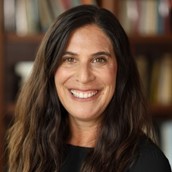¡Desconecta con la aplicación Player FM !
Julie Cederbaum, University of Southern California – Supportive Adults Make the Difference in the Lives of Foster Youth
Manage episode 443908433 series 2459839
 The lives of foster children can be hard, but adults can help.
The lives of foster children can be hard, but adults can help.
Julie Cederbaum, associate professor in the Suzanne Dworak-Peck School of Social Work at the University of Southern California, explores how to make a difference.
Julie Cederbaum is an associate professor in the Suzanne Dworak-Peck School of Social Work. Her work focuses on the impact of childhood adversity and family processes on the well-being of youth. Using a dyad and family systems lens, her research explores the strengths and challenges experienced by diverse families, and ways in which parenting processes and behaviors (i.e. parent–child communication, parental monitoring, parent–child relationship, and parental role modeling) and positively influence mental health, reproductive health, and substance use behaviors in children, adolescents and young adults.
Supportive Adults Make the Difference in the Lives of Foster Youth
https://academicminute.org/wp-content/uploads/2024/10/10-07-24-USC-Supportive-Adults-Make-the-Difference-in-the-Lives-of-Foster-Youth.mp3Experiences of abuse and neglect, particularly those that results in foster care, can have a lifelong negative impact. While there is evidence demonstrating the importance of social support in overcoming adversities experienced in childhood, there is limited research exploring how social supports contribute to positive functioning of youth who have been maltreated, particularly in later young adulthood. The aim of this work was to uncover external resources that individuals with child-welfare-documented maltreatment used to achieve positive functioning in their transition to adulthood.
Drawing from participants enrolled in an ongoing longitudinal study of the effects of maltreatment, 21 young adults with maltreatment histories who had successful adjustment at age 18 completed an interview with the study team. All conversations were recorded and transcripts reviewed and coded by our study team.
We found that social support from different parents of one’s life made a significant impact on their transition to adulthood. At the individual level, this included (1) people from their family of origin (parents, grandparents, aunts/uncle, and/or siblings), (2) peers, (3) foster parents, (4) school-based adults, (5) adults in mentoring programs, and (6) child welfare workers. There were also positive impacts that came directly from support that came from the child welfare system.
Our findings offer preliminary information to understand how individual and systems supports promote positive wellbeing in the transition to adulthood for youth with histories of child-welfare involvement. Study themes highlight the importance of building formal supports for maltreated youth to promote positive wellbeing and successful transitions into adulthood.
Read More:
[The Conversation] – Young adults who fare relatively well after spending time in the child welfare system say steady support from caring grown-ups made a big difference
The post Julie Cederbaum, University of Southern California – Supportive Adults Make the Difference in the Lives of Foster Youth appeared first on The Academic Minute.
287 episodios
Manage episode 443908433 series 2459839
 The lives of foster children can be hard, but adults can help.
The lives of foster children can be hard, but adults can help.
Julie Cederbaum, associate professor in the Suzanne Dworak-Peck School of Social Work at the University of Southern California, explores how to make a difference.
Julie Cederbaum is an associate professor in the Suzanne Dworak-Peck School of Social Work. Her work focuses on the impact of childhood adversity and family processes on the well-being of youth. Using a dyad and family systems lens, her research explores the strengths and challenges experienced by diverse families, and ways in which parenting processes and behaviors (i.e. parent–child communication, parental monitoring, parent–child relationship, and parental role modeling) and positively influence mental health, reproductive health, and substance use behaviors in children, adolescents and young adults.
Supportive Adults Make the Difference in the Lives of Foster Youth
https://academicminute.org/wp-content/uploads/2024/10/10-07-24-USC-Supportive-Adults-Make-the-Difference-in-the-Lives-of-Foster-Youth.mp3Experiences of abuse and neglect, particularly those that results in foster care, can have a lifelong negative impact. While there is evidence demonstrating the importance of social support in overcoming adversities experienced in childhood, there is limited research exploring how social supports contribute to positive functioning of youth who have been maltreated, particularly in later young adulthood. The aim of this work was to uncover external resources that individuals with child-welfare-documented maltreatment used to achieve positive functioning in their transition to adulthood.
Drawing from participants enrolled in an ongoing longitudinal study of the effects of maltreatment, 21 young adults with maltreatment histories who had successful adjustment at age 18 completed an interview with the study team. All conversations were recorded and transcripts reviewed and coded by our study team.
We found that social support from different parents of one’s life made a significant impact on their transition to adulthood. At the individual level, this included (1) people from their family of origin (parents, grandparents, aunts/uncle, and/or siblings), (2) peers, (3) foster parents, (4) school-based adults, (5) adults in mentoring programs, and (6) child welfare workers. There were also positive impacts that came directly from support that came from the child welfare system.
Our findings offer preliminary information to understand how individual and systems supports promote positive wellbeing in the transition to adulthood for youth with histories of child-welfare involvement. Study themes highlight the importance of building formal supports for maltreated youth to promote positive wellbeing and successful transitions into adulthood.
Read More:
[The Conversation] – Young adults who fare relatively well after spending time in the child welfare system say steady support from caring grown-ups made a big difference
The post Julie Cederbaum, University of Southern California – Supportive Adults Make the Difference in the Lives of Foster Youth appeared first on The Academic Minute.
287 episodios
همه قسمت ها
×Bienvenido a Player FM!
Player FM está escaneando la web en busca de podcasts de alta calidad para que los disfrutes en este momento. Es la mejor aplicación de podcast y funciona en Android, iPhone y la web. Regístrate para sincronizar suscripciones a través de dispositivos.




